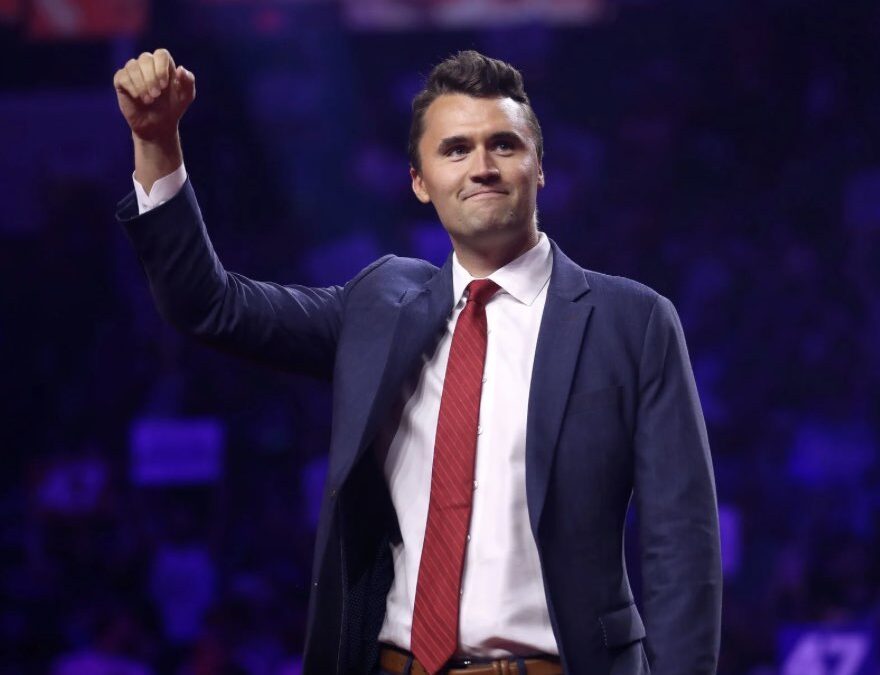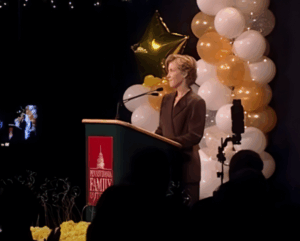On September 10, 2025, our nation lost a bold and faithful conservative voice when Charlie Kirk was assassinated at just 31 years old. The horrific news sent shockwaves through millions within the US and around the world, who had been touched by his passion for truth, his defense of life, and his unapologetic defense of Christianity.
As Michael Geer, President of Pennsylvania Family Institute, wrote the day after Charlie’s passing:
“I’ve been fighting back tears since hearing the heartbreaking news of Charlie Kirk’s assassination yesterday afternoon. When the initial reports came in, our staff gathered to pray for a miracle, asking God to spare his life. Sadly, that was not to be. We also prayed and continue to pray for our nation—to seek peace, repentance, and revival, and for an end to the political violence that has gripped our land.”
The loss is especially heavy when we remember his young family.
Charlie leaves behind his wife, Erika, and their two children, just three and one years old. Their grief connects with another moment of tragedy in our nation’s history. On September 11, 2001, Todd Beamer gave his life resisting terrorists aboard Flight 93. His widow, Lisa, bore testimony to God’s faithfulness amid suffering. As Michael reminded us, “Both Charlie and Todd, along with their wives, Erika and Lisa, had dedicated their lives to Jesus Christ, their source of hope.”
A Life Anchored in Christ
Charlie was clear about what defined him: “I’m nothing without Jesus. I’m a sinner. I fall incredibly short of the glory of God. We all do. I gave my life to the Lord in fifth grade, and it’s the most important decision I’ve ever made, and everything I do incorporates Jesus Christ.”
That faith drove his vision for America. He often pointed out that freedom and responsibility only flourish in a society grounded in God’s truth: “The mechanisms of a religious society [are] good for everybody. When somebody walks around and thinks that you were created and that you’re not God, you tend to have better citizens.”
Just days before his assassination, Charlie posted words that now ring with eternal hope: “Jesus defeated death so you can live.”
Courage for His Faith
In a June 2025 interview, Charlie was asked how he wanted to be remembered. His answer was simple: “I want to be remembered for courage for my faith. That would be the most important thing. The most important thing is my faith.”
That courage showed up in countless ways—whether sparring with skeptics, equipping pastors, or challenging young people to build strong families rooted in faith. He spoke of conservatism not as an angry reaction, but as an uplifting call to virtue: “You have to try to point them toward ultimate purposes and toward getting back to the church, getting back to faith, getting married, having children. That is the type of conservatism that I represent, and I’m trying to paint a picture of virtue, of lifting people up, not just staying angry.”
A Call to Carry the Torch
At a vigil held in Charlie’s honor last Sunday, our Communications Director, Josue Sierra, had the opportunity to share his reflections.
“I met Charlie only a couple of times. He was smart. Driven. He had a vision for what a better country could look like. And he had a passion for young people in a way that few people do. The main thing that motivated Charlie was changing our country for the better—and he knew the only way to change a nation is through the hearts of its citizens. He understood the only thing that can change a heart is the Gospel.”
Charlie’s life was dedicated to fostering deeper discussions, especially with those that disagreed with him on college campuses. His boldness went deeper than just policy issues or politics. As Joseph Backholm put it in his reflections on his Facebook, “He wasn’t hated for political engagement. No one shot at him because of his position on global warming or corporate taxes. He was murdered because every day he challenged the god of radical self-autonomy that insists we can be whatever we want and do whatever we want. He was fighting a spiritual war, and he did so in a way that most churches are afraid to do, because of the opposition they know they’ll face. He knew the opposition, faced it, kept smiling, and kept going.”
That captures the reality of Charlie’s life and legacy: he didn’t shy away from speaking objective truth into the cultural lies of our time, even when those who opposed him threatened with violence and even when he risked saying something the wrong way. He was willing to be challenged and to learn. And he understood that the ultimate battle is spiritual, and he fought it with clarity, conviction, and determination.
This is the question left for every one of us:
What is your eternal destination?
Where do we go from here?
What will you do with your life?
As I said that night: “Pick up Charlie’s microphone. Show up, stand up, and speak out about objective truth. It’s not politics. It’s not so-called “culture war”. Speaking up is about being a good parent, a good Christian, a good neighbor, and a good citizen.”
Light in the Darkness
Charlie Kirk’s life is a reminder of Isaiah’s warning:
“Woe to those who call evil good and good evil, who put darkness for light and light for darkness” (Isaiah 5:20).
In the end, Charlie Kirk’s legacy will not be defined by how he died, but by his life lived with purpose—with courage, conviction, and unshakable faith in the transformative power of Jesus Christ.
Timeless Advice on Confronting Tragedy From Lisa Beamer.



